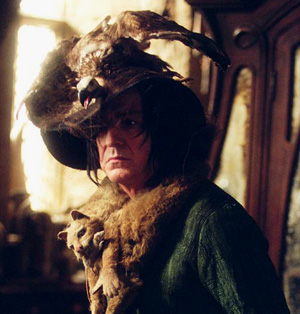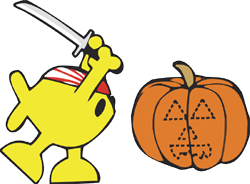Halloween, Horrors, and ‘Star Wars’
Do you “observe” Halloween? Not observe it? Have you changed from one view to another? Share your thoughts below. Or peruse the following Halloween-related links. Or give your views on the horror(?) that is The Mouse’s assimilation of a willing Star Wars franchise.

Concerning Halloween — James B. Jordan
In this column the theologian and author of Through New Eyes: Developing a Biblical View of the World and Creation in Six Days: A Defense of the Traditional Reading of Genesis One shares his Biblical/historical view of Halloween’s origin. “This is “the best article on Halloween written, hands down,” says SF contributor A.T. Ross. “Jordan mops the floor with legalism and all of the myths many Christians have still imbibed.” From Jordan:
Satan’s great sin (and our great sin) is pride. Thus, to drive Satan from us we ridicule him. This is why the custom arose of portraying Satan in a ridiculous red suit with horns and a tail. Nobody thinks the devil really looks like this; the Bible teaches that he is the fallen Arch-Cherub. Rather, the idea is to ridicule him because he has lost the battle with Jesus and he no longer has power over us.
[…] Thus, the defeat of evil and of demonic powers is associated with Halloween. For this reason, Martin Luther posted his 95 challenges to the wicked practices of the Church to the bulletin board on the door of the Wittenberg chapel on Halloween. He picked his day with care, and ever since Halloween has also been Reformation Day.
Shooting at Halloween pumpkins — E. Stephen Burnett
From myself: “At Halloween, do demons really run wild over neighborhoods and souls? Or might Christians ‘demonize’ decorations, to the glee of the actual Devil? This former pumpkin-‘killer’ explores our actual worst enemies, and the One Who defeated them.”
Satan, The Imaginary, And Halloween — Rebecca LuElla Miller
From Becky: “How we as Christians celebrate Halloween, then, hinges on these three factors — our view of Satan, our understanding of the imaginary, and what we want to say to our culture. Is there one right way of doing Halloween? I don’t believe so. I do believe we should avoid pointing the finger at other Christians and saying that they’re doing it wrong.”
Casting the ‘riddikulus’ spell on Halloween
 This is my summary of a fantastic piece at a blog called Alastair Adversaria, Of Boggarts. My summary: “The author’s suggestion: the Harry Potter series, by virtue of its created-world and with its third book’s specific subplot about fighting against certain magical creatures, can help Christians react better to some evils.” More from the author:
This is my summary of a fantastic piece at a blog called Alastair Adversaria, Of Boggarts. My summary: “The author’s suggestion: the Harry Potter series, by virtue of its created-world and with its third book’s specific subplot about fighting against certain magical creatures, can help Christians react better to some evils.” More from the author:
In the light of the gospel we can, like Harry and his classmates, learn to perform the riddikulus charm on our demonically-induced fears. After the gospel has taken effect we can mock things that once terrified us. This is one of the purposes of the celebration of Halloween. The gospel reveals that much of the fear that Satan excited in men prior to the advent of Christ resulted merely from the exaggerated shadows that he cast in the darkness. Now that light has come the shadows are removed and Satan is reduced to a far less terrifying stature. We can begin to laugh at the shapes that we once saw in the shadows.
Whilst there are undoubtedly evil forces at work in our world — Harry’s world contains Dementors and Death Eaters, not just Boggarts — we need to learn that many of the terrors that haunt us are merely products of our fearful imaginations. Satan loves to have the huge shadows that he tries to cast taken seriously. We will only truly defeat him when we learn to laugh at the shadows, walking through death’s shade while fearing no evil.
Speaking of the Devil’s work and the defeat of evil …
Darren Aronofsky’s Noah: Environmentalist Wacko — Brian Godawa
 The Biblical fantasy novelist and screenwriter (To End All Wars) is not a fan of the Noah movie script. (The film, starring Russell Crowe, recently had its filming interrupted by the real-life floods of Hurricane Sandy.) The movie fails in its absurd creative license, radical-environmentalist themes, characters, and especially its portrayal of God. From Godawa:
The Biblical fantasy novelist and screenwriter (To End All Wars) is not a fan of the Noah movie script. (The film, starring Russell Crowe, recently had its filming interrupted by the real-life floods of Hurricane Sandy.) The movie fails in its absurd creative license, radical-environmentalist themes, characters, and especially its portrayal of God. From Godawa:
Noah is depicted as attempting to follow God’s will in the script, a will that includes the complete annihilation of the human race, as opposed to the Genesis depiction of starting over with eight humans to repopulate and ultimately provide a Messiah.
[…] It seems everyone in this story is more compassionate than God.
Speaking of horrors and Brian Godawa …
An Apologetic of Horror — series by Brian Godawa
In this series he sets the record straight on the horror genre — not every horror story or film, some of which do celebrate evil, but the perception that all horror stories are only evil.
Horror is not an inherently evil genre of storytelling. It can be used for gratuitous evil purposes, or for godly moral purposes. The Bible tells many stories using the horror genre in order to inspire holy fear of evil and admonish or chastise those in sin.
Finally …
If you know Axe Cop, this needs no explanation. Only celebration.
If you don’t know Axe Cop, you may make the error of one YouTube commentator: “This looks like it was invented by a nine-year-old!” A five-year-old, actually. And drawn by his grown-up (and professing Christian) cartoonist brother.












































I took a look at what Halloween really is in our small town – a night where families gather together, go out in the local community, knock on doors, and meet people — neighbors and friends in their own homes, many of those people are people whom we rarely if ever see the rest of the year. Some years back, we made handmade thank-you cards as a family. The reasons were twofold and obvious – by creating Thank-you cards, we were instilling the idea that there is no free lunch, that you should not look to your neighbors for handouts without giving something freely in return. And secondly, it gave us an opportunity to allow our kids to dress up, walk around with friends, knock on doors, and make a good impression with our neighbors and other members of our community.
People often glanced through the card to see if they were receiving a tract – they weren’t. The messages are deliberately general, warm, homey, and friendly. The primary motivation was to say “Thank you for your kind gift” and build some positive communication with people that we generally don’t see the rest of the year. I argue that Halloween is the perfect time to get out as Christian families and make contact in the community.
I think I’m still in transition between being a Halloween Hater (which I finally realized–through God’s diligent application of scripture to my heart–was just me trying to be holier than God) and having a right understanding of Halloween and it’s proper place in a Christian’s life.
I still prefer to “celebrate” Reformation day. I love that the quote by James Jordan connects the two.
In years past, we have hosted Reformation Day parties instead of Halloween parties, but this year, due to all but one of my children being grown and gone from the house, and to having taken on a new job and still getting used to scheduling everything around it, I just didn’t have the energy or time to get one organized.
A friend invited my youngest (who is still at home) to go trick or treating with her–I expect the other siblings will give a little sigh (or perhaps even a groan) when they find out that she is the only one of my children to have been allowed to trick or treat…;)
I used to say that Bible movies are like giant snake movies: most are very, very bad, only a couple are decent, and people aren’t coming for the movie as opposed to see the snake. Even more than Christian art, Bible stories are constrained by the nature of the source, and they are hard to do well.
I’ll be working tonight, and I often do during Halloween, so the choice to celebrate it isn’t always mine. Normally I don’t, but increasingly I miss seeing kids in their costumes. I don’t really accept the idea that secular people celebrate a pagan holiday when they do Halloween any more than they are celebrating the birth of Jesus with Christmas-apart from those who actually are devout and do so, it’s just an excuse to party.
Lucasfilm, ugh. Disney’s live-action films aren’t their strong suit, and honestly neither are Lucasfilm’s themselves: they always seemed to do better at video games in modern years, and Disney’s strength is in its feature animation, and it’s impressive marketing power towards tween girls. I worry that they would give Star Wars the Tron: Legacy treatment-technically flashy but bland movies relying on geek hype to get viewers.
If a Christian wants to shun Halloween based on its pagan roots, that’s fine with me. But to be consistent, he must do the same with Christmas and Easter.
I like what John says in his comment above: however the holiday may have begun (and there are a number of unsavory legends associated with it), the celebration today is about fun and community, not about the underworld.
But what about a new believer who has a history of occult practices, who thinks of Halloween as the devil’s holy day rather than a time for family fun? That believer would be wise to not celebrate the day.
I see it as a matter of conscience. Absent any cut-and-dried commandments concerning it (i.e., Let not thy children put on strange costumes and knock on thy neighbor’s door), seems like we should each handle it in the way God leads us.
I remember dressing up and celebrating Halloween for maybe three years (when I was 3, 4, and 5) but after that, my parents decided it wasn’t something they wanted us to be involved in anymore.
The first couple of years after that, we’d have a dress up party with candy at home to make up for the perceived lack, but after that I didn’t pay much attention to the holiday. My family started homeschooling when I was 6, so after that none of my friends celebrated Halloween either, so I didn’t think I was missing out. We did have a couple Reformation parties though. Living in the middle of a cornfield, we never did have to worry about trick-or-treaters coming to the door 🙂
It’s a little awkward at work, when most people dress up for the day, but nobody’s ever given me a hard time about it. They’re all used to my general weirdness 🙂
In college, well, last year Frank the Bunny stalked me for awhile, and I have trouble taking my professor seriously when she’s wearing cat ears and a tail . . .
I mostly just ignore the holiday. When someone wishes me a happy Halloween, I tell them to have a nice day, too. But Halloween is not something I want to exert any time, energy or funds (I know a guy who spent $56 for his costume!!!) on. If I ever have kids of my own, I probably look for Reformation Day or harvest festivals for us to celebrate.
I never really got much of a chance to dress up as a kid for Halloween, and now I’m saving up for cosplays of Doctor Who characters (basically, costuming as a character). Both of the churches I’m involved with are hosting activities for families today–one boasts a “Trunk-or-Treat” and the other is holding a harvest festival. But I don’t have strong feelings one way or another. I just like the candy.